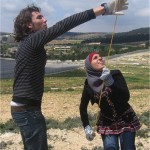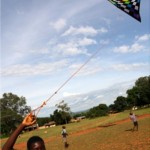According to Wikipedia:
“Social entrepreneurship is the work of a social entrepreneur. A social entrepreneur is someone who recognizes a social problem and uses entrepreneurial principles to organize, create, and manage a venture to make social change (a social venture). Whereas a business entrepreneur typically measures performance in profit and return, a social entrepreneur focuses on creating social capital. Thus, the main aim of social entrepreneurship is to further social and environmental goals. However, whilst social entrepreneurs are most commonly associated with the voluntary and not-for-profit sectors, this need not necessarily be incompatible with making a profit.”
Ashoka http://www.ashoka.org/social_entrepreneur states “Social entrepreneurs are individuals with innovative solutions to society’s most pressing social problems. They are ambitious and persistent, tackling major social issues and offering new ideas for wide-scale change.
Rather than leaving societal needs to the government or business sectors, social entrepreneurs find what is not working and solve the problem by changing the system, spreading the solution, and persuading entire societies to take new leaps.”
Those at Kitegang.org are social entrepreneurs who’ve developed a “non-profit toy company that experiments with new and different ways to empower traumatized kids, who, in turn may just continue on with wider eyes and softer hearts.”
Their website explains; “Kitegang is a 501(c)(3) non-profit toy company, with its roots in Minnesota, and aspirations in every orphanage and slum around the globe, where children find themselves lacking the tools to dream a little higher.
 Essentially what we do is focus on developing new ways to help kids be kids in some of the toughest places on earth. A few have called this decadent, but from our vantage point, the prospect of 100 million mal-adjusted orphans unleashed on the world is a daunting forecast to contend with down the road. In turn, we train people to make imaginative new toys and establish local businesses around their production.
Essentially what we do is focus on developing new ways to help kids be kids in some of the toughest places on earth. A few have called this decadent, but from our vantage point, the prospect of 100 million mal-adjusted orphans unleashed on the world is a daunting forecast to contend with down the road. In turn, we train people to make imaginative new toys and establish local businesses around their production.
We then help finance the toys they produce, and ultimately give 75% of everything made away to local organizations working with traumatized children.
It’s not rocket science, but hopefully we can still help relax and inspire a few thousand curious kids who, in turn, will continue on with wider eyes and softer hearts.
 Operationally, Kitegang understands the importance of economic development opportunities on the margins of the developing world. Psychosocial activities, such as play, are often a wonderful investment. Yet they are often more constructive if local communities are also simultaneously benefitting from economic growth. In turn we focus a tremendous amount of our efforts on training adolescents and young adults on the particulars of manufacturing toys within urban slums, rural communities, and refugee camps, where children and their families face limited opportunities. To date, countless hours and over $100,000 have been invested directly into empowering local social entrepreneurship around the manufacturing of toys. Quite often this is in areas where, due to insecurity, traditional investment is starved. Yet we typically find eager partners that more than make up for the difficulties with ample blood, sweat, and tears.
Operationally, Kitegang understands the importance of economic development opportunities on the margins of the developing world. Psychosocial activities, such as play, are often a wonderful investment. Yet they are often more constructive if local communities are also simultaneously benefitting from economic growth. In turn we focus a tremendous amount of our efforts on training adolescents and young adults on the particulars of manufacturing toys within urban slums, rural communities, and refugee camps, where children and their families face limited opportunities. To date, countless hours and over $100,000 have been invested directly into empowering local social entrepreneurship around the manufacturing of toys. Quite often this is in areas where, due to insecurity, traditional investment is starved. Yet we typically find eager partners that more than make up for the difficulties with ample blood, sweat, and tears.
In the end, the results are often very meaningful. Not often perfect, but certainly consequential. The profits from these activities, subsequently, are then used in part to finance the distribution of our educational and inspirational toys to schools, orphanages, and NGOs requesting such resources. Utilizing these tools, we seek to help energize conventional education and development efforts, while also increasing connectivity and understanding between children around the world. With the belief that play is a basic developmental need for children everywhere, Kitegang hopes to augment the larger efforts of the development community, and in turn make the world of tomorrow dream a little higher.
 Toward this end, Kitegang has strived to partner with a wide variety of organizations around the globe to achieve the most meaningful results possible. For example, Kitegang is collaborating with the Tesfa Foundation, a front-line educational organization in Ethiopia, working to improve primary education in communities where an early step ahead can be critical. By exploring the potential benefit of offering parents part-time work sewing kites to finance their children’s education, Kitegang is striving to help at-risk families get all of the educational tools they need to succeed.
Toward this end, Kitegang has strived to partner with a wide variety of organizations around the globe to achieve the most meaningful results possible. For example, Kitegang is collaborating with the Tesfa Foundation, a front-line educational organization in Ethiopia, working to improve primary education in communities where an early step ahead can be critical. By exploring the potential benefit of offering parents part-time work sewing kites to finance their children’s education, Kitegang is striving to help at-risk families get all of the educational tools they need to succeed.
Beyond such long term investments in education and employment, Kitegang has also been proudly sticking to its outreach roots, sharing as much fun as it can with the kids who need it most. For example, seeing so many refugee children fleeing the horrors of Darfur motivated us to take action. Consequently, the Darfur Kite Festival was born as a semi-annual project to help inspire and support the children of Darfur in the best way we knew how. Working together with SOS Children’s Villages on this collaborative project, we have been pursuing innovative psycho-social programming on the front lines of Chad, attempting to help children both with special needs, as well as those children simply yearning for a bit of fun, recover from the emotional trauma of fleeing Darfur. After helping thousands of children build, decorate, and fly their own kites, we’re hopeful that by expressing themselves and seeing the power of their own creativity, more children will find increasing reasons to smile at the future, while slowly coming to terms with their past.
 A third example of the types of organization Kitegang works with is Raising Malawi, a large and dynamic group of orphanages in the southern African nation of Malawi. By supplying kites (and eventually other activities) to the orphans at Raising Malawi, Kitegang is attempting to offer support and encouragement to the children of communities ravaged by HIV and AIDS. While a small gesture, Kitegang hopes to augment the excellent work of regional orphanages that can ill-afford such activities and help the children do more than merely survive.”
A third example of the types of organization Kitegang works with is Raising Malawi, a large and dynamic group of orphanages in the southern African nation of Malawi. By supplying kites (and eventually other activities) to the orphans at Raising Malawi, Kitegang is attempting to offer support and encouragement to the children of communities ravaged by HIV and AIDS. While a small gesture, Kitegang hopes to augment the excellent work of regional orphanages that can ill-afford such activities and help the children do more than merely survive.”

